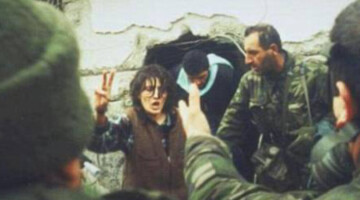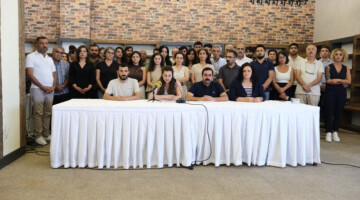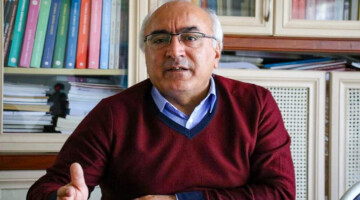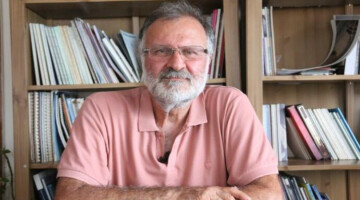On 19 December 2000, a bloody massacre took place in Turkish prisons under the cynical name "Return to Life". The operation was directed against political prisoners who were resisting the introduction of F-type prisons. One of them was sociologist Veli Saçılık, who is now a board member of the Peoples' Democratic Party (HDP). He lost an arm at the time when a bulldozer tore down the wall of his cell.
On the occasion of the anniversary, Veli Saçılık spoke to ANF about the situation at that time. He said that at that time the state wanted to enforce the transition to the small cell system: "The state wanted to usher in a neoliberal era and assumed that the Kurdish movement would be cornered by the Imrali trial and at the same time Turkey's revolutionary movement could also be eliminated. All preparations were geared towards this. The F-type was to be imposed as a system, as a way of life. The aim was a society that is isolated and disorganised in and outside the prisons and in which there is no more dialogue between people. The then DSP, ANAP and MHP parties and the National Security Council got support from the EU and first established the F-type prisons, which led to the death of 122 people in the death fast. On 19 December 2000, a big massacre was carried out in which thirty people were killed. This enforced the F-type system in our lives today."
For Saçılık, this massacre has a long history. Already in the torture prison of Amed (tr. Diyarbakir), after the military coup of 1980, attempts were made to force the political prisoners to surrender. Their Kurdish and revolutionary identity was wanted erased. On 26 September 1999, ten prisoners were cruelly killed in Ankara-Ulucanlar, told Veli Saçılık: "Then on 5 July 2000, there was an attack on the prisoners in Burdur. I was there too. This operation was like a trial run. There was no attempt to relocate us, but rather to test out how to smash the prison. Gas bombs, compressors and all kinds of methods were used. Immediately afterwards, propaganda was spread that the F-type prisons were like five-star hotels and that the current state was a bleeding wound. Later it came out that the National Security Council had given the order that the prisons should be constantly reported in the media."
Veli Saçılık pointed out that initially three organisations fought against the new detention system. A hunger strike took place, which was later changed into a death fast. The operation was justified with the alleged saving of human lives. According to government sources, the prisoners were forced to go on hunger strike by their organisations and were supposed to be saved by being transferred to F-type prisons. "However, after the transfer, thousands of people went on hunger strike and hundreds started death fasts. All deaths in the death fast took place only in the F-type prisons. In the death fast, 122 people lost their lives," Saçılık said.
Saçılık himself had his right arm torn off by a bulldozer during the operation in Burdur. The HDP politician pointed out that many more people lost body parts or their memory in prison because of the government of the time. However, the assumption that the resistance would be crushed with the small cell system did not work out; "The resistance continues even today. At the same time, silent death in isolation also continues, as is the case of Garibe Gezer."
Ironically, those who campaigned for the introduction of the F-type system at the time are also affected by the system of isolation today, said Veli Saçılık, referring to the generals who were imprisoned in the Ergenekon trial and after the attempted coup by the Gülen community: "One of the policemen was found dead in his cell, hundreds of sick prisoners have died. Here is Turkey, anything is possible at any time. For this reason, we said then that the F-type prisons must be closed, and we are still saying this today.
There is absolute isolation in Imrali today, and there is isolation in the other prisons as well. Isolation is torture, and we don't just say that, we resist it. Just recently, two sick prisoners lost their lives. I have known Halil Güneş as a sick prisoner since 1995. Since then, he has not been treated medically, he was killed openly. That's how it is in prisons. However, prisons are not only places of defeat, they are places of resistance, where there is no surrender and obedience, but a continuation of the revolutionary tradition."
For the sociologist Veli Saçılık, the F-type system is a system of rule designed to control people and deprive them of their will. It corresponds to the palace regime, with which an unopposed society is meant to be established throughout Turkey: "We are all supposed to feel lonely and the starting point is the F-type. There is resistance against those who want to create a climate of fear inside and outside and threaten a bloodbath. As Selahattin Demirtaş said: Courage is contagious. There are still people in society who courageously resist oppression. We agree that the F-type has spread to the whole society, but we don't accept that we have surrendered."














